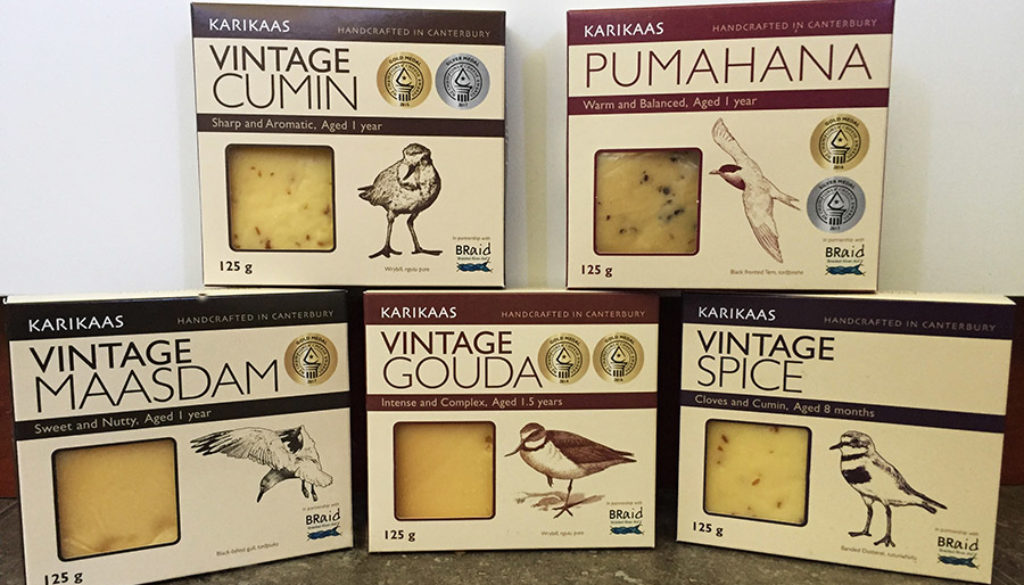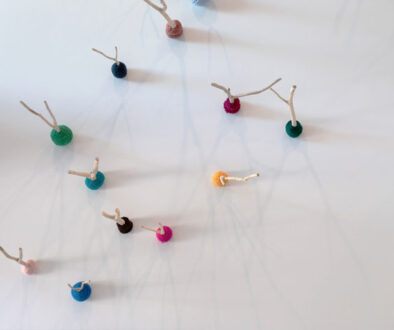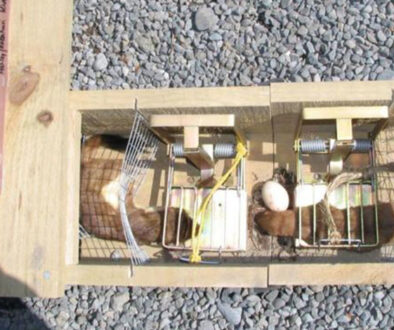Newsletter #35
Greetings,
Following on from our last newsletter, we are delighted to announce that Karikaas, makers of some of New Zealand’s yummiest cheeses, has partnered with BRaid. Their award-winning cheeses are now going to be packaged in ‘braided river bird’ themed boxes. Each handcrafted cheese includes information about wrybill, black-billed gulls, black-fronted terns, or banded dotterels, and includes a collectable fridge magnet of one of the birds. Karikaas is also donating a percentage of every purchase to the Ashley Rakahuri Rivercare Group. The boxed ‘braided river bird’ cheeses will be in Foodstuffs supermarkets (Four Square, New World and Pak’nSave) in the South Island over the coming weeks, and next year will also be available in the North Island. (I’m going to have to keep buying more as Christmas prezzies because I keep eating them.
Death of a wrybill: Less pleasing was the death of a wrybill chick and its about-to-born sibling thanks to a 4×4 driver who blatantly ignored the warning signs and drove over their nest. This was particularly tragic for the parents, which had lost their previous nest to unseasonal flooding. The article in Stuff and on our Facebook page circled the globe, and the reaction was swift but to no effect. Isn’t it about time we changed the messages on our signs from
Please be Careful to Stop or risk a $100,000 fine/ 2 years in prison?
On a more hopeful note, following the trapping workshop held in Woodend late October (thanks to everyone who attended, and Predator Free NZ for sponsorship), a trapping group has formed to create a trapline around the Ashley River estuary. This helps connect with existing traplines maintained by ECan, Tuhaitara Coastal Park, and the Ashley Rakahuri Rivercare Group, with the goal of re-introducing kakī/ black stilt. This is not a pipe dream. There’s been a resident kakī/ black stilt living in the Ashley River for some years. Grant Davey took these photos last week (unfortunately mud obscures the bands). The hybrids nearby are most likely the result of it mating with a poaka/pied stilt. But it does demonstrate that the birds can survive and successfully breed in this area. Next job: raise $5,000 to buy enough traps.
This will be our final newsletter for 2017, so I hope Santa brings you lots of goodies and that you have a great New Year.
Cheers,
Sonny Whitelaw
Manager
Waikuku Beach & Area Clean-Up Day: 09 December: Enjoy a day of information stalls, meeting your local NGOs and government bodies, swap n share tables, arts and crafts, kids activities and face painting, live music and a DJ plus more. No need to book, just turn up from 10am-3pm.
Hurunui River bird survey 12/13 December (next week): DOC is planning the survey from the junction with the Mandamus River down to the sea. They are looking at doing a variety of sections on the one day to get it all done, so double-check the date. If you can help out and/or pass this along with your networks, it would be much appreciated. Please contact Simon Elkington, Biodiversity ranger at DOC Phone: 03-3130830 or 027514680
Makarora River bird survey (and new web page to host it) is now available. And breaking news! They have just received funding to set up a river care group. Well done, Rachel, for countless hours of hard work to reach this pivotal moment.
Waimakariri River bird survey from the gorge to SH1. The complete report is not yet available online, but I should have it up by the next newsletter. Over 150 wrybill were seen, including just below the Gorge bridge. The fact that they have succeeded in such a busy area demonstrates just how tolerant they can be relative to human disturbance. (And a big thank you to Anna P. who called me after spotting one of the wrybills and 2 chicks).
Bird surveys by drone: how do birds react? There’s not much out there in the literature, and since every bird species is likely to behave differently, last weekend we tested a Mavic Pro drone over the colony of black-billed gulls that started nesting in the Ashley Rakahuri. Typically, they arrived after the annual bird count a week earlier…. See for yourself how the gulls and a nesting SIPO reacted. Mike Bell from Wildlife International Ltd. also used a drone over the Ashburton River colony of black-billed gulls and white-fronted terns and had a similar reaction (although no SIPO). This paper in Nature (the link is to the news report as the paper is firewalled) supports our very very limited experiences that bird counts with a drone are far more accurate. If you use or are aware of others using a drone to count birds, I would appreciate you letting me know so that we can gather informal data on the efficacy and possible risks from/to some bird species.
Avian Botulism: there are several reports from around Canterbury. While it appears to primarily target waterfowl, there have been instances of gulls, including one black-billed gull, being affected. The black-billed gull in question was treated and recovered. If you would like more information, email me.
For all upcoming events in 2018, I will be updating our online calendar as soon as I have time. Publicise your event! If you remind me a week or so ahead, I’ll also promote it through our social media network. This is FREE publicity, so take advantage of it. NB: the event must be related to braided rivers or river birds.
Check our Facebook page regularly, as events posted there often expire within days.
Unusually high temperatures mean…
- La Niña conditions (NIWA)
- More pests – rats like warm and dry (STUFF)
- Higher sea temperatures = changes in oceanic ecosystems (with a flow-on effect on seabirds) (STUFF)
- Higher sea-levels = saltwater invasion in estuaries/upstream (in part due to thermal expansion)
- Greater demand for reliable water supplies = risk to river levels.
- Greater concentration of algae and bacterial growth = risk of disease.




